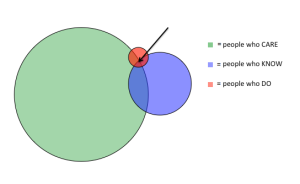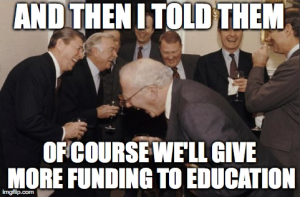With graduations happening left and right, I find myself having a lot of emotions.
On one hand, I feel old and sad and depressed that I’m still in school. I mean, I have two different diplomas. Why am I not a grown up yet? (Note: this is why.) On the other hand I feel thankful that I am no longer a pretentious, self-assured teenager. For example, I recently saw a kid post on Facebook, “I am SO ready to graduate!” That made me want to: 1) cry; 2) vomit; 3) murder him; and 4) quit Facebook. Because, seriously, that kid has no idea.
But then on yet another (third?) hand, I feel angry. And you should feel angry, too. Therefore, in the cathartic spirit of mutual anger, let us (only partially) put aside hard data for the next few paragraphs and focus a little on feelings.
Let’s start with why I’m angry: Education is suffering in Oklahoma. Suffering like Dallas Cowboys fans in the 4th quarter. It’s not suffering from a lack of attention, as evidenced by the myriad of statuses, links, and blog posts appearing daily on my Facebook timeline. Obviously, people don’t post stuff on Facebook if they don’t care about it.
(Humorous Facebook interlude.)
Yet in spite of all this attention, education continues to suffer. Here are the highlights: Oklahoma is 44th in the U.S. in per-pupil funding. We are 42nd in percentage of college graduates. We are 43rd in “Chance for Success”–whatever that means. The list goes on. If there’s an educational ranking, my state is probably near the bottom. Even teachers and school district superintendents think things are generally suck-ish.
The problem is made worse by inexplicable cuts to K-12 funding and a state superintendent who is probably about as well liked in Oklahoma as a certain U.S. President. Blaming budget cuts and education officials is easy and—let’s face it—appropriate. But that doesn’t answer the question everyone keeps asking: Why isn’t this problem being solved?
I think the answer is relatively simple: Because no one is solving it. Allow me to explain this arguably-sardonic observation with a theory I just made up–the General Theory of Problem Solving.
The Theory claims that there are three types of people necessary to solve any problem: (1) those who know about the solutions; (2) those who care about solving the problem; and (3) those who can actually do something about it. In order to fix our education problem, for instance, we need those three groups to overlap.

Now here’s the kicker: those groups are not all equal in composition or authority. So we end up with one group of people (parents and teachers, mostly) caring about the problem; another group knowing about the solution (social scientists and some educators); and another group actually able to implement the solution (legislators). But very few people have all three qualities. Recognizing that the only people who can take action in this case–legislators–are also the smallest group of the three, we find our bottleneck.
Therefore, it seems that the perfect solution to our educational woes is to teach our legislators about education policy so they will recognize the errors of their ways. Problem solved!
Now that we’ve had a good laugh, let’s get real: we have about as good a chance of persuading our legislators as this guy does of ever having a good hair day. Perhaps we should take a step back… We can’t influence the legislators of today, but maybe we can influence the legislators of tomorrow. Ride this crazy train with me for a moment.
We teach our students history, even well into college. We teach them math and science (HuffingtonPost says we suck and those too, by the way) and a host of other classes because we deem those “important” for the common citizen to know. But why don’t we teach them about education? Education impacts politics, socioeconomics, even life expectancy. It dramatically affects everyone and everything. Education is basically the Victoria’s Secret Fashion Show of subjects. (Note: if you get anything out of this post, I want it to be that last sentence.)
(While we’re on this topic, I would argue that biology is the geography bee of subjects [we’re going meta here], while trigonometry is the amateur competitive eating of subjects. This probably warrants a whole separate blog post.)
So here’s my ideal solution: We require all students to take education classes. Simple as that. Then some day, those students will lose a bit of their sanity and decide to run for office (see: Rob Ford). Now imagine how much differently our legislators would value education if they had studied it, if they knew about it, if they could be intellectual and passionate about it.
There are a variety of roadblocks and pitfalls that come with this solution, of course, but I’m going to ignore them for the sake of brevity. Also it’s my article, so I can do what I want. Bottom line: If 100% of our students learn about education, then 100% of our future lawmakers will know about education. That sounds like a surefire plan I can get behind.
Even though I can rest easier knowing that my groundbreaking Theory has solved a complex social problem, I’m still upset about graduation season. For one thing, it means kids are going to be out of school for three months, galavanting around town and annoying everyone (i.e., me) with their loud music and sideways hats. But more importantly, high schoolers are the epitome of unbridled optimism, and as a college graduate I am trained to be deeply suspicious of that sort of person.
But–and this is a big but–maybe they’re onto something. Maybe we can allow ourselves to be optimistic about the future, but only if we do something about it right now. I, for one, am going to do my part and learn: About the problems, about the solutions, and about what I can do to fix things. I think that’s at least a good place to start. And it’s a good way to keep from crying while listening to Vitamin C’s “Graduation” on repeat.



